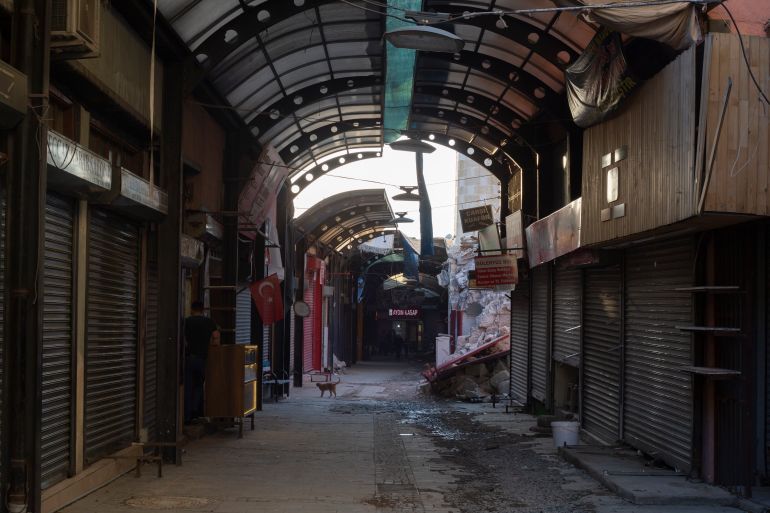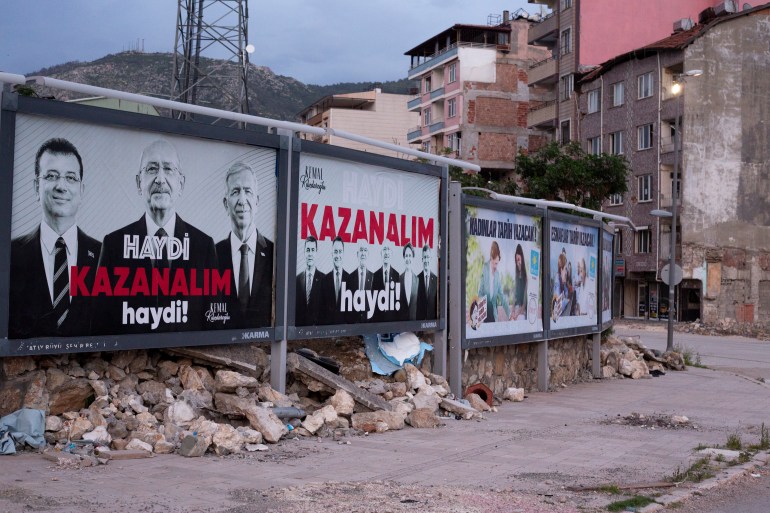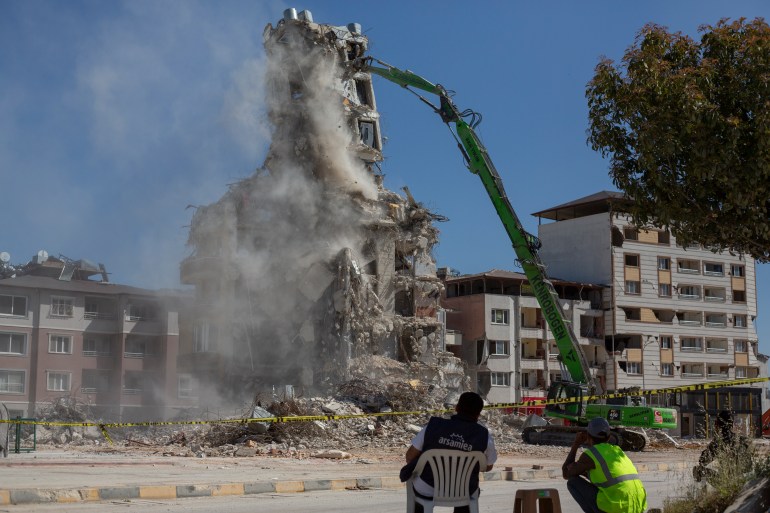Turkey’s Antakya gears up to vote amid earthquake devastation
Thousands of residents who left the southern city face additional challenges in exercising their franchise.

Antakya, Turkey – Ali Bilgin stayed behind in Antakya after devastating earthquakes on February 6 triggered an exodus from the city in southern Turkey.
The human rights lawyer pitched tents outside his damaged home in a southern suburb and has been fixing the damage himself. Some of his guests remain fearful of entering homes, but he was recently able to get up to the roof of the two-floor detached house and enjoy a view of the city.
Keep reading
list of 3 itemsDon’t take our votes for granted, warn Kurdish voters in Turkey
Turkey’s elections: What are the key alliances promising?
Ahead of Turkey’s presidential and parliamentary elections on May 14, he has been training volunteers to work as election observers at polling stations across the region of Hatay.
“Our aim is to protect every single vote,” said Bilgin, who volunteers with Oy ve Otesi (Vote and Beyond). Founded in 2014, the civil society group will dispatch about 1,000 observers, mostly locals, in Hatay, and tens of thousands across the country.
“We want to prevent any move that could allow the government or any political party to cast a shadow over the elections,” he told Al Jazeera. While civil society observers cannot act on any irregularities, they can alert observers from political parties at polling stations.
The elections, in which President Recep Tayyip Erdogan faces the biggest challenge to his two decades in power, are taking place three months after earthquakes destroyed parts of southern Turkey and northwestern Syria. Nearly 51,000 people died in Turkey alone.

‘We are trying to bring them back’
In Antakya, the extent of the devastation is unlike anywhere else. Streets and neighbourhoods are lined with crumbling, uninhabited buildings, several stories high. Many of the buildings that are still standing are severely damaged and will need to be torn down.
Antakya is a ghost city and holding polls will be a challenge. One of the main concerns is how many of the nearly 1,100,000 registered voters will be able to make it to polling stations. Many residents left the city for camps or nearby rural areas, while others moved to different regions and would have to travel back to vote.
“We lost a lot of our citizens. Officially, 23,000,” said Luftu Savas, the mayor of Hatay’s metropolitan municipality and a member of the main opposition Cumhuriyet Halk Party (Republican People’s Party, CHP). He told Al Jazeera that according to the municipality’s count, approximately 475,000 people left the province, mostly from Antakya.
“Some of them, 10-15 percent, have moved their address to another city and will vote there. Most of the people who live in the city centre are our [opposition] voters,” he added. “We are trying to bring them back, but flights aren’t an option,” he said, referring to the closure of Hatay’s airport to incoming flights, officially because of damage to the runway.
Turkey’s High Election Board (YSK) said earlier this year that only 133,000 people from the earthquake region have re-registered to vote elsewhere. This is of an estimated three million who are displaced, according to the United Nations.
“We are organising buses from Antalya, Mersin, Konya, but still, many of them won’t be able to come,” Savas added.
The CHP has set up a logistics coordination office based out of containers in the parking lot of a petrol station on a highway outside the city.
The party’s district deputy head, Hakan Karatas, said more than 16,000 voters from 75 different cities applied for assistance to travel back to Hatay during the week of the elections.
“The election could have been delayed, or the city could have been given special status,” Karatas said, reflecting a feeling voiced by many displaced voters across Turkey, who think they should have been able to vote for their local parliament member in Hatay without having to face the logistical challenges of travelling back.
On May 6, the government’s disaster relief agency, AFAD, announced help for those who wished to travel back to the earthquake region to vote.

Back only to vote
While loud rallies take place across the country, there are no large gatherings and no songs blasting from buses in the earthquake area, where campaigning is limited to meetings with citizens, officials said.
Much of the region has historically been a stronghold of the incumbent president – and there is little to suggest that the earthquake has significantly dented that support. However, Hatay is considered a competitive region, where Erdogan’s Adalet ve Kalkınma Party (Justice and Development, AK Party) currently holds five seats, followed by the CHP’s four.
Erdogan has promised to rebuild millions of homes within a year. The opposition has said it aimed to reverse the president’s unorthodox economic policies, largely blamed for the freefall of the Turkish lira against the dollar and runaway inflation. It also pledged to do away with the presidential system introduced after a referendum in 2017 and restore Turkey to a parliamentary democracy.
In the old part of Antakya, the site of the ancient city of Antioch, Roman-era cobbled streets and Ottoman mosques are largely in ruins. The iconic Saray Street is a pile of rubble that has hardly been moved since the earthquakes struck.
Some of the stores in the old bazaar have reopened. Umut, 28, was sitting at a phone repair store his friend recently set up. He returned from Ankara a week back for the elections.
“I think we need change,” he said, adding that he could not bring himself to be optimistic.
“Look at this,” he added, pointing at the rubble that bulldozers are still moving. He planned to leave again after the elections.
“I think I will go to Eskisehir [a city in northwest Turkey], for one or two years,” he said, “I’ll do anything, any job. When I feel better psychologically, I’ll come back.”
As half of the citizens of Turkey look at the coming days with hope for a turning point in their country’s history, residents of Antakya look at their devastated city and wonder how long it will take before it is rebuilt.
“Our home is heavily damaged and will have to be demolished,” said Hakan Cam, a 41-year-old security guard who lives with his wife Ayfer, their 10-year-old son and mother-in-law Zahife in a tent camp on the outskirts of the city.
“Thank god, we are alive,” said Zahife. “But we have nothing, there is nothing left.”
While the camp appears relatively clean and organised, hygiene remains an issue as more than 200 tents are pitched here.
“On Sunday, I will drive Ayfer to the polling station,” said Cam, who unlike his wife, has voted for the governing party in the past. “I will be there. But this year, I won’t vote.”